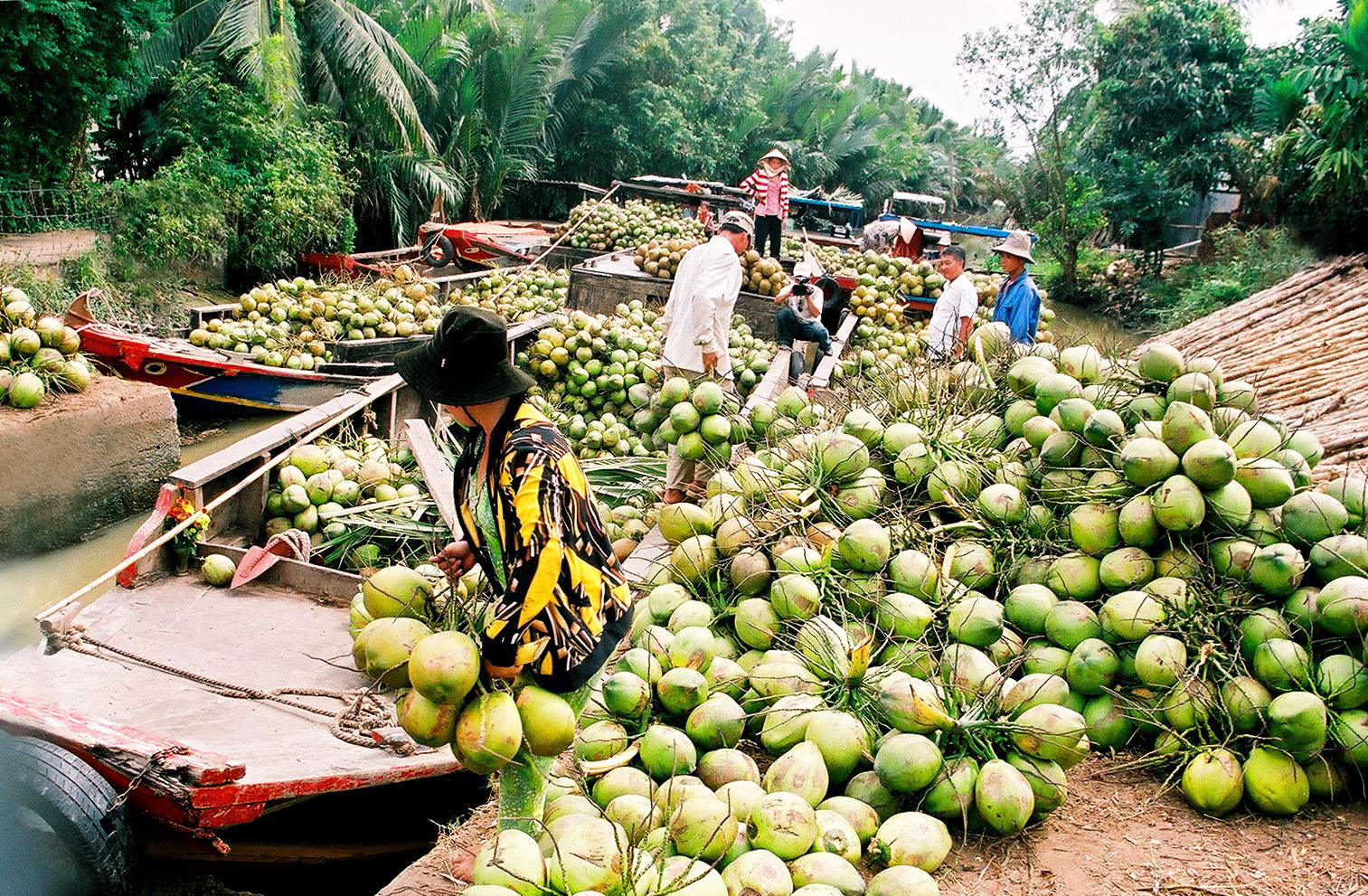A billion-dollar opportunity for Vietnamese coconuts
05/09/2023
Vietnam has the opportunity to create another billion-dollar export item. When the US opened the door to Vietnam’s coconuts for official export and China was developing a Protocol on importing coconuts from Vietnam.
Promotion to open many potential markets
According to information from the Ministry of Agriculture and Rural Development, the Department of Animal and Plant Health Inspection Service (APHIS), the US Department of Agriculture has sent a letter to the Plant Protection Department (Ministry of Agriculture and Rural Development) informing about the US opened the market with Vietnamese coconut skulls to this market.
APHIS said that the evaluation results showed that the Vietnamese skullcap coconut meets the requirements of the US side for processed products and has a negligible risk of spreading plant pests. This means that instead of going through a new and lengthy market access regulatory process for fresh fruits and vegetables, APHIS has leveraged existing regulations for processed products to regulate shipments of coconut skulls. APHIS has also completed updating the online database of agricultural import requirements (ACIR) to approve the import of young Vietnamese coconuts, having separated at least 75% (3/4) of the coir and completely remove the green outer shell.
Accordingly, Vietnamese producers can start exporting skullcaps to the US immediately, as APHIS classifies shelled coconuts as non-germinating commercial coconuts. The pulp and coconut water inside can be used as food, so the only phytosanitary requirement is that these shipments must be inspected at US ports of entry. In addition, APHIS also said that it has notified the US Customs and Border Protection Agency with the update to avoid any delays in shipments at US ports of entry.
Not only the US, according to the plan in August, the General Department of Customs of China will visit the field to inspect the growing areas and packing facilities of fresh coconut in our country that have official export demand. During this inspection, the General Administration of Customs of China will focus on inspecting the system of control and prevention of pests on coconuts at the planting areas and packing facilities; registration process for plantations and export packing facilities, training and pest monitoring…; epidemic prevention work of exporting enterprises (arrangement of gardens, measures to prevent epidemics, use of plant protection drugs, training of staff); the process of harvesting, transporting and packing coconuts for export;…
The inspection will help China assess in detail the safety and quality control system of Vietnam’s coconut exports, thereby offering appropriate management measures to ensure safe and effective coconut exports. Thereby improving transparency, strictly controlling the quality and safety of coconuts exported from Vietnam to China, contributing to promoting the signing of the Protocol on the export of fresh coconuts between the two countries. After the inspection, China will carry out a risk assessment process and propose appropriate import requirements to develop a Protocol on importing coconuts from Vietnam.
Branding for coconut products
According to the VCA, Vietnam is currently ranked 7th in coconut production in the world with more than 180,000 hectares of agricultural land used to grow coconuts. Large numbers are concentrated in the central coastal provinces and the Mekong Delta such as Tra Vinh and Ben Tre. Currently, coconut growing localities are making great efforts to improve product quality. In order to export coconuts to China smoothly, businesses have invested in building organic coconut farms, so far, there have been more than 7,000 hectares of certified organic coconut.
Cao Ba Dang Khoa, acting Secretary General of VCA, assessed that currently, the coconut industry has developed about 200 products, including some high-value products that are exported to difficult markets such as Finland, through which has affirmed the brand of Vietnamese coconut in the world market. Realizing the potential and opportunities of the coconut industry, VCA is coordinating with many industries and localities to organize activities to improve production capacity and build brands for coconut products. In particular, the Vifa Expo 2023 event is the opening activity for a series of trade promotion programs of the industry in 2023. The purpose of this organization is to target a wood industry market using sustainable materials from sustainable materials, including coconut trees and handicrafts from coconuts.
Thus, it can be seen that Vietnam has favorable conditions to develop this industry and the export potential of coconut products is still very large. Especially when the US has opened the door for Vietnamese coconuts and China now wants to connect and promote the import of Vietnamese coconuts by official channels. Most of coconut products are popular in this country such as desiccated coconut, fiber, candy, fiber mesh, jelly, desiccated rice, coconut milk.
In order to meet the needs and export standards of the world market, VCA is building a sustainable raw material area for coconut farmers to enjoy high prices, and at the same time, creating competitiveness in the international arena. VCA will support the export promotion of coconut products to China, penetrate more markets in Japan and the EU and the US. With the goal of sustainable development, the coconut industry encourages businesses to participate in deep processing. The fact that Vietnam’s coconuts achieve the official export “visa” to the US will help Vietnam’s coconut exports soon reach the billion-dollar mark.
Recommending some solutions to better exploit the Chinese market for Vietnamese coconut products, talking to a reporter from the Customs Magazine Assoc. Prof. Dr. Pham Tat Thang, Institute of Strategy and Policy Research (Ministry of Industry and Trade). Industry and Trade) said that localities, manufacturing and exporting enterprises need to increase the application of production models according to VietGAP and GlobalGAP standards to fully meet the increasingly strict regulations on testing and quarantine by the Chinese Government. In addition, it is necessary to focus on sustainable development, which is to increase the proportion of deep processing, which not only helps control costs but also increases the value of goods by 3-4 times compared to fresh products. In particular, this activity also helps to increase the shelf life of agricultural products, freeing the situation of local oversupply.
Source: Customs News


